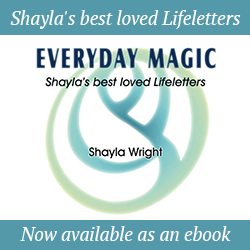
“Want to tap the depths of your creativity? Marry your soul.
See you at the wedding”
~Danielle LaPorte
When I was growing up, we had all kinds of people coming to our house: people working for the government, people in business and the trades, and artists. From the very beginning, I felt a strong attraction to the artists. They felt warm, alive and open. I liked being around them, though I couldn’t have said why at that time. Now I know it was because of their availability, their vitality, and their sense of being comfortable inside their own skin. They were genuinely interested in me, in life. They seemed to be less ‘grown up’ , less stiff, more ready to play, than the other more distinguished people who came to visit.
As a result of those early connections, I grew up wanting to be an artist. I was not so focused on painting, or music or sculpture, but much more interested in living a creative life, an emergent life, a life full of surprise and adventure. This love of deep creativity has never left me; much of my life has been about exploring the ways in which we can nourish this creative capacity in ourselves, in our communities and in our world.
These days, the question of how we will access our creative energy seems more relevant and more urgent than ever. How will we find our way through our current challenges without a series of massive creative breakthroughs? It actually feels that we may not even survive this global crisis without surrendering to the force of innovation, without leaning deeply into our collective creative intelligence. How will we find the courage and power to leave behind what is familiar and comfortable, so that we can discover something new, something that will disrupt all of our old ways of knowing and perceiving?
Working with people all over the world who long to live inside this creative energy, here is what I have discovered: it’s not so easy to live this way. It’s actually very challenging to embody this kind of creative vitality. Our human culture is not designed to support our wild, courageous creativity. Have you noticed this? We need to become a new kind of human being if we want to open to the life giving force of our creative energy. We can think about this, talk about it, but getting into the water is a very different story!
There are all kinds of difficulties and obstacles that we encounter as we get closer and closer to this river of life, of passion, of creative flow. If we are serious about this, we will have to find new ways to ground the energy, to open together to our core creativity, and to engage with it as a practice, like meditation, yoga, running, working out.
Recently, Google released the results of a study they did called Project Aristotle. Here’s the link to an excellent article by Charles Duhigg about this project and what they found out:
Google wanted to be able to track the differences between two kinds of teams in their culture: the ones that were creative, daring and innovative, and who consistently delivered results, and the teams that were not able to perform at this level of creative intelligence.
What they found was not what they expected. They discovered something very surprising: these very innovative and successful teams had co-created a culture of psychological safety. It turns out that it was this common ground of safety that the top teams had in common.
Psychological safety, writes Duhigg is ‘‘a sense of confidence that the team will not embarrass, reject or punish someone for speaking up…It describes a team climate characterized by interpersonal trust and mutual respect in which people are comfortable being themselves.’’
He goes on to say that what Project Aristotle has taught people within Google is that “no one wants to put on a ‘‘work face’’ when they get to the office. No one wants to leave part of their personality and inner life at home. But to be fully present at work, to feel ‘‘psychologically safe,’’ we must know that we can be free enough, sometimes, to share the things that scare us without fear of recriminations. We must be able to talk about what is messy or sad, to have hard conversations with colleagues who are driving us crazy. We can’t be focused just on efficiency.”
Another thing that emerged during Project Aristotle is that this kind of safety is non-hierarchical. In a culture like this, everyone’s voice is heard and respected. Meetings are not about just listening to the same two or three people speak. They realized, doing this research, that as long as everyone got to speak, the teams did well. When one person, or a small group dominated the room, things did not go so well. Why not? Because their collective intelligence declined. They no longer had access to the resources of the whole field, only to a small part of it.
There seems to be something significant in the fact that this essential element of safety has been documented by one of the most powerful companies on our planet. Google didn’t set out to create this kind of safety-it emerged as the most crucial resource for supporting our capacities to be creative, daring, innovative and co-operative.
As the violence around us escalates, and the fear and aggression along with it, creating a space for radical creativity feels like a bright current in the river of our life, gently pulling us forward.
Good poetry begins with
the lightest touch,
a breeze arriving from nowhere,
a whispered healing arrival,
a word in your ear,
a settling into things,
then like a hand in the dark
it arrests your whole body,
steeling you for revelation.
In the silence that follows
a great line
you can feel Lazarus
deep inside
even the laziest, most deathly afraid
part of you,
lift up his hands and walk toward the light.
— David Whyte, “The Lightest Touch
with love,
Shayla
photo credit: Dane Deaner on Unsplash
2 Comments
Join the conversation and post a comment.


If we hesitate
Are we lost?
You can’t get across the street
unless
with awareness
focused
you step off the curb
Hi Shayla,
Thanks for another catalyst for contemplation. What seems most apparent in all that is happening in the world right now is the shedding of deeply held belief systems, those of right and wrong, left and right, intrenched ideologies and richeousness and the emphasis on race, color, and culture as divisions between humans beings. As these deeply held dividing structures break down, we are left in free fall, naked with none of the old patterns to grab on to { as you spoke about in a previous life letter }. The result of this, if we do ride it out , is the realization that we never did have control and that we are just being lived. To be authentic during this ‘chaotic perfection’ is to find that true voice deep down that as you put it, ” to share things that scare us without recriminations” and to allow others that same privilege. Just recently a new courage to speak my truth no matter what, is creating a sense of ‘psychological safety’ regardless of the reaction of others.
Love and respect,
Carol